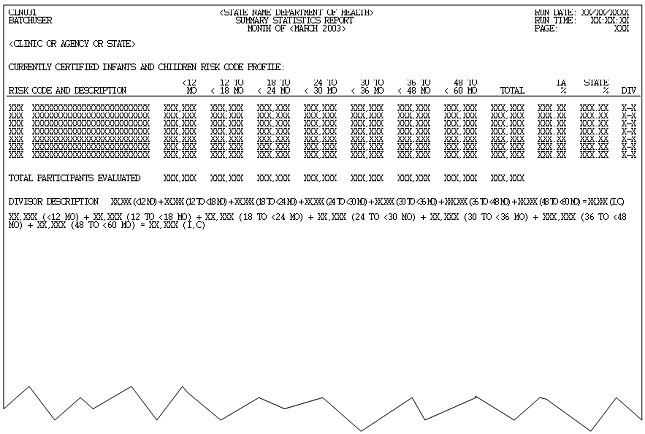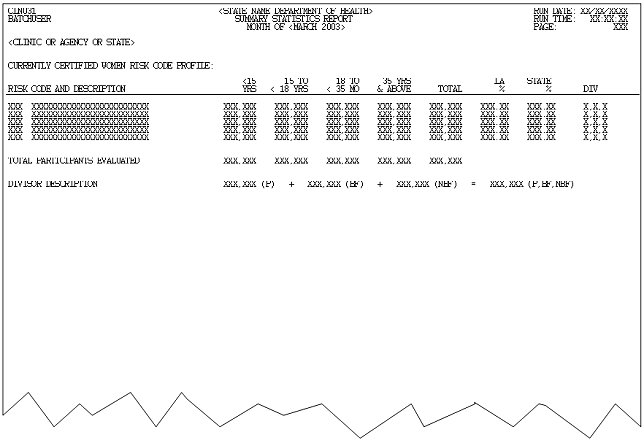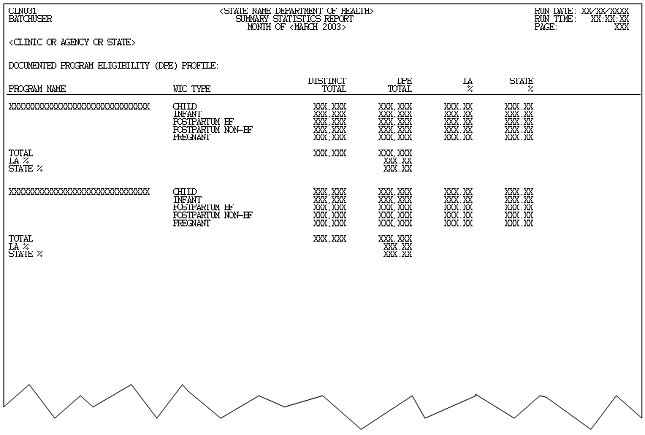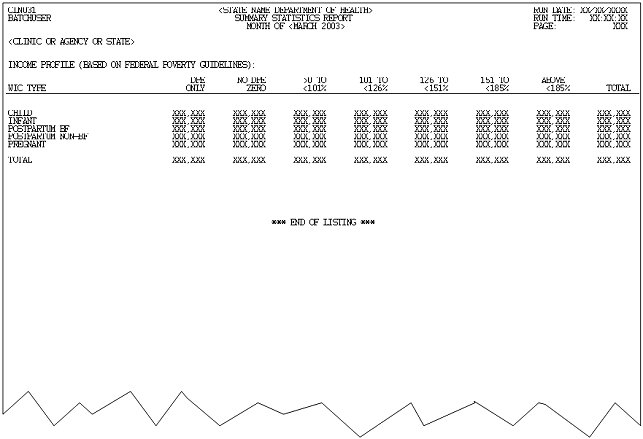
Contents Show
The Summary Statistics Report (CLN031) is a multi-part report. The report provides total counts of participants by age for associated risk codes, counts of participants for associated program eligibility and counts of participants by income level.
The report runs as part of the End of Month Processing when the state business rule MONTHEND_INCL_STATE_DEFINED_RPTS equals "Y". This report is defined as a Minnesota specific report.
The report has the following sections.
Currently Certified Infants and Children Risk Code Profile
Participants are counted for each risk factor assigned
Currently Certified Women Risk Code Profile
Participants are counted for each risk factor assigned
Documented Program Eligibility (DPE) Profile
Income Profile (Based on Federal Poverty Guidelines)




This section describes the data elements that print on the system output. Because of space constraints, the layout may be slightly different and/or all characters may not print within the space allotted.
Origin of Data Element
During the End of Month Processing, this is the CCYYMM value from the CurrentMonthEndDt column of the ProcessControl table.
Format
This is an accounting month and year formatted as Month Name CCYY.
Origin of Data Element
The selection criteria and information being reported determines this value as follows:
When the reporting clinic data, the agency code, agency description, clinic code, and clinic description are printed.
When reporting agency data, the agency code, and agency description are printed.
When reporting state data, the text description of "State Total is printed.
Format
This is a fifty-character text value. The format is determined by the information being reported.
Origin of Data Element
This value is the code and description of risk code factors assigned to selected participants. The code is taken from the RiskFactorID column of the RiskFactor table and the description comes from the RiskFactorReference table.
Format
The code is a six character value. The description is a sixty character value.
Origin of Data Element
The value is the count of selected participants where the DateOfBirth column of the Member table is greater than the last day of the reported month minus 12 months. If the reported date is 12/31/2010, participants' date of birth must be greater than 12/31/2009.
Format
This is a six-digit value.
Origin of Data Element
This value is the count of selected participants where the DateOfBirth column of the Member table is less than or equal to the last day of the reported month minus 12 months and greater than the last day of the reported month minus 18 months. If the reported date is 12/31/2010, participants' date of birth must be less than or equal to 12/31/2009 and greater than 06/30/2009.
Format
This is a six-digit value.
Origin of Data Element
This value is the count of selected participants where the DateOfBirth column of the Member table is less than or equal to the last day of the reported month minus 18 months and greater than the last day of the reported month minus 24 months. If the reported date is 12/31/2010, participants' date of birth must be less than or equal to 06/30/2009 and greater than 12/31/2008.
Format
This is a six-digit value.
Origin of Data Element
This value is the count of selected participants where the DateOfBirth column of the Member table is less than or equal to the last day of the reported month minus 24 months and greater than the last day of the reported month minus 30 months. If the reported date is 12/31/2010, participants' date of birth must be less than or equal to 12/31/2008 and greater than 06/30/2008.
Format
This is a six-digit value.
Origin of Data Element
This value is the count of selected participants where the DateOfBirth column of the Member table is less than or equal to the last day of the reported month minus 30 months and greater than the last day of the reported month minus 36 months. If the reported date is 12/31/2010, participants' date of birth must be less than or equal to 06/30/2008 and greater than 12/31/2007.
Format
This is a six-digit value.
Origin of Data Element
This value is the count of selected participants where the DateOfBirth column of the Member table is less than or equal to the last day of the reported month minus 36 months and greater than the last day of the reported month minus 48 months. If the reported date is 12/31/2010, participants' date of birth must be less than or equal to 12/31/2007 and greater than 12/31/2006.
Format
This is a six-digit value.
Origin of Data Element
This value is the count of selected participants where the DateOfBirth column of the Member table is less than or equal to the last day of the reported month minus 48 months. If the reported date is 12/31/2010, participants' date of birth must be less than or equal to 12/31/2006.
Format
This is a six-digit value.
Origin of Data Element
This value is the count of selected participants.
Format
This is a six-digit value.
Origin of Data Element
For the clinic report, this value is calculated by dividing the Total count for the risk code line by the clinic total of the appropriate age category counts from the Divisor Description line. The result is multiplied by 100 and rounded to the nearest hundredth. The following are examples:
If this risk factor is only used for infants, the value is the Total count for the risk code line divided by the clinic number of infants reported on the Divisor Description line (total for < 12 mo).
If the risk factor is only used for children (of all age categories), the value is the Total count for the risk code line divided by the clinic number of children reported on the Divisor Description line (totals for 12 to <18 mo thru 48 to < 60 mo).
If the risk factor is only used for infants and children of age category 1, the value is the Total count for the risk code line divided by the clinic number of infants and children with age category 1 reported on the Divisor Description line (totals for < 12 mo thru 18 to <24 mo).
For the agency report, this value is calculated by dividing Total count for the risk code line by the agency total of the appropriate age category counts from the Divisor Description line. The result is multiplied by 100 and rounded to the nearest hundredth.
For the state report, this value is calculated by dividing the Total count for the risk code line by the state total of the appropriate age category counts from the Divisor Description line. The result is multiplied by 100 and rounded to the nearest hundredth.
Format
This value is a three-digit number plus two decimal places.
Origin of Data Element
This value is calculated by dividing the state Total count for the risk code line by the state total of the appropriate age category counts from the Divisor Description line. The result is multiplied by 100 and rounded to the nearest hundredth.
Format
This is a three-digit value plus two decimal places.
Origin of Data Element
This value represents the age categories applicable to this risk code. The number value correlates to the column for the age category.
If the risk code is only applicable to infants, the value is 1.
If the risk code is not applicable to infants but is applicable to all children, the value is 2-7.
If the risk code is applicable to infants and all children, the value is 1-7.
If the risk code is only applicable to children of age category 1 (Child 1 year to 2 years), the value is 2-3.
If the risk code is only applicable to children of age category 2 (Child 2 years to 3 years), the value is 4-5.
If the risk code is only applicable to children of age category 3 (Child 3 years to 5 years), the value is 6-7.
If the risk code is only applicable to children of age categories 1 and 2, the value is 2-5
If the risk code is only applicable to children of age categories 2 and 3, the value is 4-7
Format
This is a three-character text value. The format is determined by the information being reported.
Origin of Data Element
This value is a count of participants by age. Age groups are the same as column headings. Participants are counted only once regardless of the number of risk factors assigned. The total column represents the total number of participants selected.
Format
This is a six-digit value.
Origin of Data Element
This value is a count of participants by age. Age groups are the same as column headings. Participants are counted only once regardless of the number of risk factors assigned. The total column represents the total number of participants selected.
Format
This is a six-digit value.
Origin of Data Element
This value is the code and description of risk code factors assigned to selected participants. The code is taken from the RiskFactorID column of the RiskFactor table and the description comes from the RiskFactorReference table.
Format
The code is a six-character value. The description is a sixty-character value.
Origin of Data Element
This value is the count of selected participants where the DateOfBirth column of the Member table is less than the last day of the reported month minus 15 years. If the reported date is 12/31/2010, participants' date of birth must be less than 12/31/1995.
Format
This is a six-digit value.
Origin of Data Element
This value is the count of selected participants where the DateOfBirth column of the Member table is less than or equal to the last day of the reported month minus 15 years and greater than the last day of the reported month minus 18 years. If the reported date is 12/31/2010, participants' date of birth must be less than 12/31/1995 and greater than 12/31/1992.
Format
This is a six-digit value.
Origin of Data Element
This value is the count of selected participants where the DateOfBirth column of the Member table is less than or equal to the last day of the reported month minus 18 years and greater than the last day of the reported month minus 35 years. If the reported date is 12/31/2010, participants' date of birth must be less than 12/31/1992 and greater than 12/31/1975.
Format
This is a six-digit value.
Origin of Data Element
This value is the count of selected participants where the DateOfBirth column of the Member table is less than or equal to the last day of the reported month minus 35 years. If the reported date is 12/31/2010, participants' date of birth must be less than 12/31/1975.
Format
This is a six-digit value.
Origin of Data Element
This value is the count of selected participants.
Format
This is a six-digit value.
Origin of Data Element
For the clinic report, this value is calculated by dividing the Total count for the risk code line by the clinic total of the appropriate category counts from the Divisor Description line. The result is multiplied by 100 and rounded to the nearest hundredth. The following are examples.
If this risk factor is only used for pregnant women, the value is the Total count for the risk code line divided by the clinic number of pregnant women reported on the Divisor Description line.
If this risk factor is only used for breastfeeding women, the value is the Total count for the risk code line divided by the clinic number of breastfeeding women reported on the Divisor Description line.
If this risk factor is only used for non-breastfeeding women, the value is the Total count for the risk code line divided by the clinic number of non-breastfeeding women reported on the Divisor Description line.
If this risk factor is only used for pregnant and breastfeeding women, the value is the Total count for the risk code line divided by the clinic number of pregnant plus breastfeeding women reported on the Divisor Description line.
If this risk factor is only used for all women, the value is the Total count for the risk code line divided by the clinic number of pregnant plus breastfeeding plus non-breastfeeding women reported on the Divisor Description line.
For the agency report, this value is calculated by dividing Total count for the risk code line by the agency total of the appropriate category counts from the Divisor Description line. The result is multiplied by 100 and rounded to the nearest hundredth.
For the state report, this value is calculated by dividing the Total count for the risk code line by the state total of the appropriate category counts from the Divisor Description line. The result is multiplied by 100 and rounded to the nearest hundredth.
Format
This value is a three-digit number plus two decimal places.
Origin of Data Element
This value is calculated by dividing the state Total count for the risk code line by the state total of the appropriate category counts from the Divisor Description line. The result is multiplied by 100 and rounded to the nearest hundredth.
Format
This is a three-digit value plus two decimal places.
Origin of Data Element
This value represents the WIC status applicable to the risk code.
Format
This is an eight-character text value. The format is determined by the information being reported.
Origin of Data Element
This value is the count of participants by WIC Status. Participants are counted only once regardless of the number of risk factors assigned. The Total column represents the total number of participants selected.
Format
This is a six-digit value.
Origin of Data Element
This value is the count of participants by WIC Status. Participants are counted only once regardless of the number of risk factors assigned. The Total column represents the total number of participants selected.
Format
This is a six-digit value.
Origin of Data Element
This value is the name of the program(s) that the selected participants have been flagged as participating in an adjunctive eligible program. The name is taken from the Name column of the AdjunctiveIncomeEligibility table.
Format
This is a twenty-character value.
Origin of Data Element
This value is the description of each WIC Status. The values are printed in the following order:
Child
Infant
Postpartum BF
Postpartum Non-BF
Pregnant
Format
This is a 17-character value.
Origin of Data Element
This value is the count of distinct StateWICIDs of all participants flagged as participating in an adjunctive eligible program.
Format
This is a six-digit value.
Origin of Data Element
This value is the count of distinct StateWICIDs of all participants flagged as participating in an adjunctive eligible program.
Format
This is a six-digit value.
Origin of Data Element
This value is calculated by dividing the DPE Total count for the line by the Distinct Total count for the line. The result is multiplied by 100 and rounded to the nearest hundredth.
Format
This is a three-digit value plus two decimal places.
Origin of Data Element
This value is calculated by dividing the state DPE Total count for the line by the state Distinct Total count for the line. The result is multiplied by 100 and rounded to the nearest hundredth.
Format
This is a three-digit value plus two decimal places.
Origin of Data Element
This value is the sum of the Distinct Total and DPE totals.
Format
This is a six-digit value.
Origin of Data Element
This value is calculated by dividing the sum of the DPE Total count by the sum of the Distinct Total count. The result is multiplied by 100 and rounded to the nearest hundredth.
Format
This is a three-digit value plus two decimal places.
Origin of Data Element
This value is calculated by dividing the state sum of the DPE Total count by the sum of the Distinct Total count. The result is multiplied by 100 and rounded to the nearest hundredth.
Format
This is a three-digit value plus two decimal places.
This value is the description of each WIC Status. The values are printed in the following order:
Child
Infant
Postpartum BF
Postpartum Non-BF
Pregnant
Format
This is a 17-character value.
Origin of Data Element
This value is the count of selected participants where there is no income information but there is an associated adjunctive eligible program. (The AnnualAmount column of the IncomeContact table equals "0" and the participant has at least one record in the IncomeContactAdjunctiveItem table for the most current screen date.)
Format
This is a six-digit value.
Origin of Data Element
This value is the count of selected participants where there is no income information but there is an associated adjunctive eligible program. (The AnnualAmount column of the IncomeContact table equals "0" and the participant has at least one record in the IncomeContactAdjunctiveItem table for the most current screen date.)
Format
This is a six-digit value.
Origin of Data Element
This value is the count of selected participants where household size is zero or the income information provided is at poverty level or less for the household size. Participants must meet one of the following selection criteria:
Householdsize column of the IncomeContact ble equals "0" and the Householdsize column of the Household table equals "0"
The AnnualAmount column of the IncomeContact table is less than or equal to the AnnualAmount column of the IncomeEligibilityAmount table for the participant's household size and year reported
Format
This is a six-digit value.
Origin of Data Element
This value is the count of selected participants where the income information provided is greater than poverty level and less than 126% of poverty level for the household size. Both of the following must be true:
The AnnualAmount column of the IncomeContact table is greater than the AnnualAmount column of the IncomeEligibilityAmount table for the participant's household size and year reported.
The AnnualAmount column of the IncomeContact table is less than or equal to 1.25 * the AnnualAmount column of the IncomeEligibilityAmount table for the participant's household size and year reported.
Format
This is a six-digit value.
Origin of Data Element
This value is the count of selected participants where the income information provided is 126% of poverty level or greater and less than 151% of poverty level for the household size. Both of the following must be true:
The AnnualAmount column of the IncomeContact table is greater than 1.25 * the AnnualAmount column of the IncomeEligibilityAmount table for the participant's household size and year reported.
The AnnualAmount column of the IncomeContact table is less than or equal to 1.50 * the AnnualAmount column of the IncomeEligibilityAmount table for the participant's household size and year reported.
Format
This is a six-digit value.
Origin of Data Element
This value is the count of selected participants where the income information provided is 151% of poverty level or greater and less than 185% of poverty level for the household size. Both of the following must be true:
The AnnualAmount column of the IncomeContact table is greater than 1.50 * the AnnualAmount column of the IncomeEligibilityAmount table for the participant's household size and year reported.
The AnnualAmount column of the IncomeContact table is less than or equal to 1.85 * the AnnualAmount column of the IncomeEligibilityAmount table for the participant's household size and year reported.
Format
This is a six-digit value.
Origin of Data Element
This value is the count of selected participants where the income information provided is greater than 185% of poverty level for the household size. The following must be true:
The AnnualAmount column of the IncomeContact table is greater than 1.85* the AnnualAmount column of the IncomeEligibilityAmount table for the participant's household size and year reported.
Format
This is a six-digit value.
Origin of Data Element
This value is the sum of selected participants by WIC Type.
Format
This is a six-digit value.
Participants are included in the counts for this section of the report if they meet the following selection criteria. Data for hidden agencies is not included.
The ParticipationCYM column of the CaseloadCountEnrollment table equals the reported month.
The WicStatus column of the CaseloadCountEnrollment table equals "I" or "C".
The ProgramCode column of the CaseloadCountEnrollment table equals the WIC value.
The ParticipationCYM column of the CaseloadCount table equals the reported month.
The WicStatus column of the CaseloadCount table equals "I" or "C".
The ProgramCode column of the CaseloadCount table equals the WIC value.
The participant’s last valid certification prior to the last day of the reported month has at least one risk factor.
The participant’s age category for the last valid certification prior to the last day of the reported month is associated with the age category for the reported risk factor.
Only risk factors associated with either infants or children are reported.
Participants are included in the counts for this section of the report if they meet the following selection criteria. Data for hidden agencies is not included.
The ParticipationCYM column of the CaseloadCountEnrollment table equals the reported month.
The WicStatus column of the CaseloadCountEnrollment table equals "P", "B", or "N".
The ProgramCode column of the CaseloadCountEnrollment table equals the WIC value.
The ParticipationCYM column of the CaseloadCount table equals the reported month.
The WicStatus column of the CaseloadCount table equals "P", "B", or "N".
The ProgramCode column of the CaseloadCount table equals the WIC value.
The participant’s last valid certification prior to the last day of the reported month has at least one risk factor.
The participant’s age category for the last valid certification prior to the last day of the reported month is associated with the age category for the reported risk factor.
Only risk factors associated with women are reported.
Participants are included in the counts for this section of the report if they meet the following selection criteria. Data for hidden agencies is not included.
The ParticipationCYM column of the CaseloadCountEnrollment table equals the reported month.
THe ProgramCode column of the CaseloadCountEnrollment table equals the WIC value.
The ParticipationCYM column of the CaseloadCount table equals the reported month.
The ProgramCode column of the CaseloadCount table equals the WIC value.
The participant was assigned at least one Adjunct program where the ScreenDate column of the IncomeContactAdjunctiveItem table is less than or equal to the last day of the reported month.
Participants are included in the counts for this section of the report if they meet the following selection criteria. Data for hidden agencies is not included.
The ParticipationCYM column of the CaseloadCountEnrollment table equals the reported month.
The ProgramCode column of the CaseloadCountEnrollment table equals the WIC value.
The EnrolledThisMonth column of the CaseloadCountEnrollment table equals "Y".
The ParticipationCYM column of the CaseloadCount table equals the reported month.
The ProgramCode column of the CaseloadCount table equals the WIC value.
The RptedThisMOnth column of the CaseloadCount table equals "Y".
The participant must have a record on the IncomeContact table with a ScreenDate column value less than or equal to the last day of the reported month.
The report is sorted by agency code then clinic code. The state summary prints at the end.
A page break occurs on change in clinic/agency.
State totals print at the end of the report. Grant totals are not applicable for this report.
This report is automatically generated during the End of Month Processing when the state business rule MONTHEND_INCL_STATE_DEFINED_RPTS equals "Y".
|
Software Version: 2.40.00